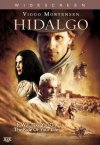BUY THE DVD:
|


|
|
|
SYNOPSIS:
| |
set in 1890, this is the story of a pony express courier who travels to saudi arabia to compete with his horse, hidalgo, in a dangerous race for a massive contest prize.
|
|
|
MOVIE FACT:
| |
film mistake: jazira says she is going to become the prince's fifth wife. islam permits a man a maximum of four wives."
|
|
|
RATING:
|



three out of four possible stars
|
|
|
|
Following the rather simple quest of one man to "find himself," Hidalgo is an old fashioned epic adventure that, while it could have seen some more vigorous cutting in the editing room, is still a beautiful adventure that viewers will follows with heart and enthusiasm. Utilizing the expanse of desert that occupies most of northern Africa, the arid location in which most of the film takes place creates visuals that can easily be likened to such films as Ben-Hur and Lawrence of Arabia. When a film takes place in a location that lends itself so easily to "epic proportions," one could consider the cinematographer and the audience lucky.
While the social conscience and the historical value in Hidalgo probably cannot be held to the same level of those aforementioned films, the movie is more of a personal journey rather than one with historical influence. There is a statement on the treatment of and massacre of American Indians during the frontier era, though the scenes dealing with it are used more as a source of mental torture for "Frank Hopkins," the real-life cowboy performer played by Viggo Mortensen. The actor wears the hat and the persona well, making the transition from his now well-known character in the "Lord of the Rings" sage easily.
Though there have been several dissenting opinions published on the authenticity of his stories, whether the story of Hidalgo and Hopkins' adventure in the Arabian desert is true or fiction, the adventure is what an Old West themed advertisement might call a, "rootin' tootin' good time." In the spirit of the time in which it was made (the extremely politically correct era of the twenty-first century), the film is not a simple adventure. It is not solely a film of good, old-fashioned theatrical entertainment.
The success of including the political conscious of today's world into the highly racist world of 1890's America is difficult, though the effort made by the filmmakers to include it might have had more significance if the atrocities done to the Indians had blended more with the story. The political issues of the day are used more as fodder for the protagonist's mental anguish than as any true statement on the climate of the time. But the filmmakers probably had to make a choice between turning the picture into a full-fledged statement on the times or into a grand theatrical adventure, and in choosing the latter they were nevertheless still able to include some of the former.
James Newton Howard's score is epic in scope, yet the composer doesn't dump a barrage of sound on the audience when a more delicate orchestral sound is more appropriate. The music has a definite Middle Eastern flair to it that can be heard even when the characters are in America. As in nearly all of his scores, Howard is able to take the time period and the persona of the characters and create a score that perfectly compliments the visuals of the film and its story.
The visuals in a cinematographically "heavy" film can sometimes overpower the cast in a movie, especially one in which the characters hopelessly cookie-cutter. Mortensen's character certainly doesn't suffer from this fault, and though some stereotypical views of Arabian nomads seep through the dialogue at times, the performances are genuine across the board. Omar Sharif plays "Riyadh" an interesting combination of a sexist nomadic Sheikh and a father who loves his only child. And since his only child just happens to be a girl, he has an interesting dilemma as he will have to sell his only child into marriage as all his other children have perished as a result of the Race in the past.
Zuleikha Robinson plays "Jazira," his daughter, and in the politically slanted climate of the film, shows more intelligence than a woman of her time would have been able to share. Louise Lombard plays another strong female role as "Lady Anne Davenport," a woman who owns horses that run in the race and who has a large amount of money riding on the outcome. The humorous thing is though that "Hidalgo," the sweetly tempered horse for whom the picture is named, easily upstages most of his co-stars in much of the film. The Spanish mustang seemingly has a full array of human emotions.
Epic in look and sound, Hidalgo is a beautiful theatrical experience and is an adventure that will play perfectly with a large bucket of popcorn while sitting in front of a giant theater screen and a loud set of surround-sound speakers. The performances (both human and equine), the cinematography, and the music all combine to make one hell of a rip-roaring adventure. A hearty supply of concession stand snacks should ensure viewers don't notice the two-plus hour length of the film. The only area where it sags is in the middle (predictable), and by the end, the honest characters and sincere performances should win most viewers over.
Review by Kelsey Wyatt.
| |
|